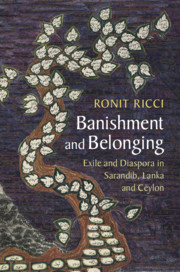Book contents
- Banishment and Belonging
- Asian Connections
- Banishment and Belonging
- Copyright page
- Contents
- Figures
- Maps
- A Note on Orthography and Manuscripts
- Acknowledgments
- Abbreviations
- Maps
- 1 Introduction
- 2 Diasporic Crossings: Malay Writing in Nineteenth-Century Ceylon
- 3 Remembering Java
- 4 “Ceyloned”: The View from the Other Shore
- 5 Exilic Journeys in Time, Place and Writing
- 6 Nabi Adam: The Paradigmatic Exile
- 7 Banishment and Interreligious Encounters: A Malay Ramayana
- 8 Ceylon Malays: Military and Literary Paths
- 9 Malay Writing in Ceylon: Roots and Routes
- Glossary
- Bibliography
- Index
2 - Diasporic Crossings: Malay Writing in Nineteenth-Century Ceylon
Published online by Cambridge University Press: 11 November 2019
- Banishment and Belonging
- Asian Connections
- Banishment and Belonging
- Copyright page
- Contents
- Figures
- Maps
- A Note on Orthography and Manuscripts
- Acknowledgments
- Abbreviations
- Maps
- 1 Introduction
- 2 Diasporic Crossings: Malay Writing in Nineteenth-Century Ceylon
- 3 Remembering Java
- 4 “Ceyloned”: The View from the Other Shore
- 5 Exilic Journeys in Time, Place and Writing
- 6 Nabi Adam: The Paradigmatic Exile
- 7 Banishment and Interreligious Encounters: A Malay Ramayana
- 8 Ceylon Malays: Military and Literary Paths
- 9 Malay Writing in Ceylon: Roots and Routes
- Glossary
- Bibliography
- Index
Summary
This chapter considers Ceylon as a crossroads by way of a close reading of a Malay Compendium from early nineteenth-century Colombo. The references and texts it contains are clear indicators of intellectual and religious connections that the Malays maintained with the archipelago and Arabia. And this realization, in turn, suggests that, rather than viewing the Malays in Ceylon as occupying a distant, marginal corner of a vast Malay sphere, their physical and figurative location between the Malay and Arab worlds signifies that crossroads, connections and movement are more appropriate conceptual categories for considering their case than is marginality. Within the Compendium and other nineteenth-century manuscripts, these connections are most concretely and minutely evident in sections containing passages translated from Arabic, paragraph by paragraph, sentence by sentence and even word by word, the latter taking the form of interlinear translation. Through an analysis of this volume’s content, language use and historical echoes, the chapter also argues for the need to look beyond the common, generalizing and flattening terminology of "Sri Lankan Malays." Deconstructing nomenclature and its history exposes the diversity of those sent into exile and enlistment in terms of language, place of origin and additional forms of affiliation.
- Type
- Chapter
- Information
- Banishment and BelongingExile and Diaspora in Sarandib, Lanka and Ceylon, pp. 23 - 48Publisher: Cambridge University PressPrint publication year: 2019



